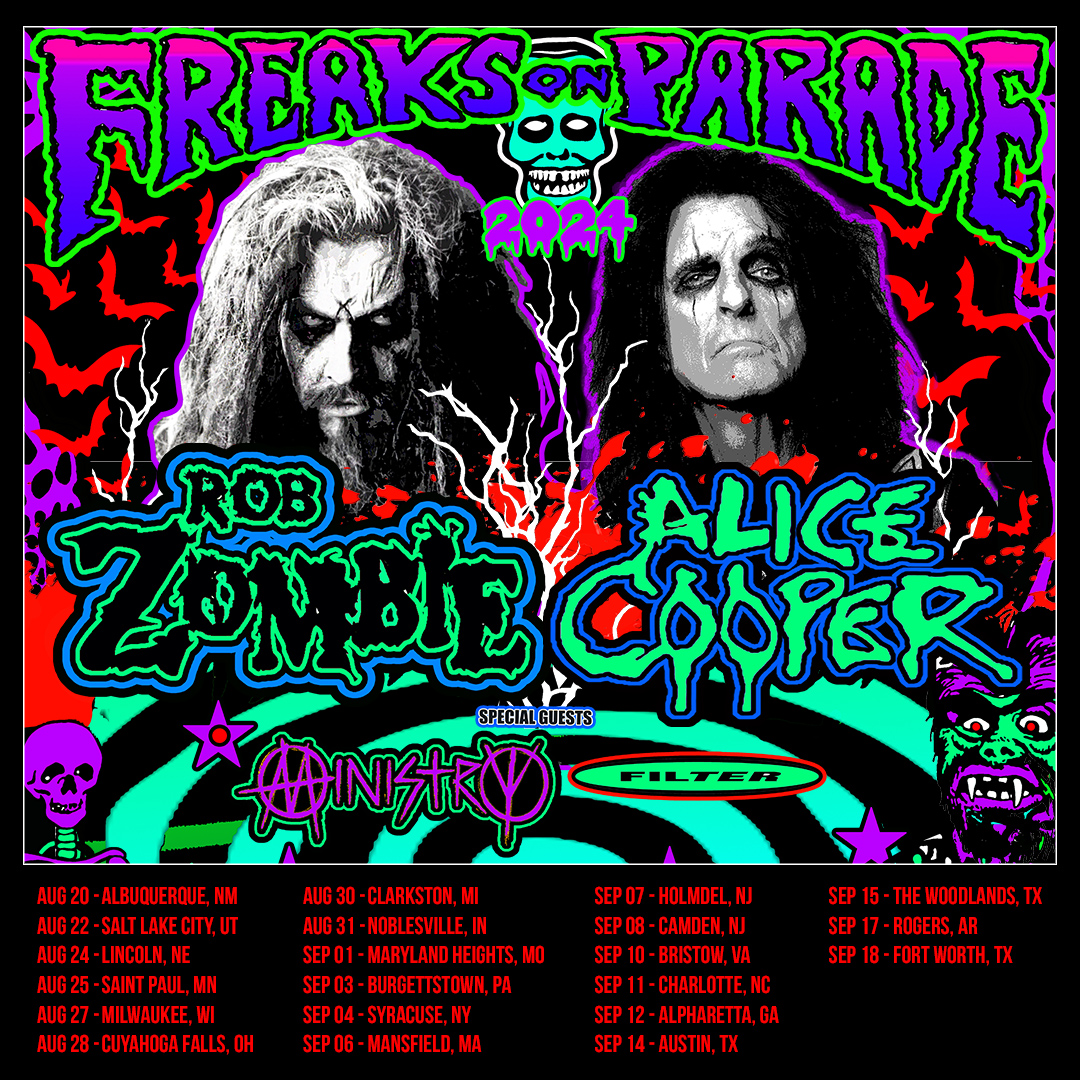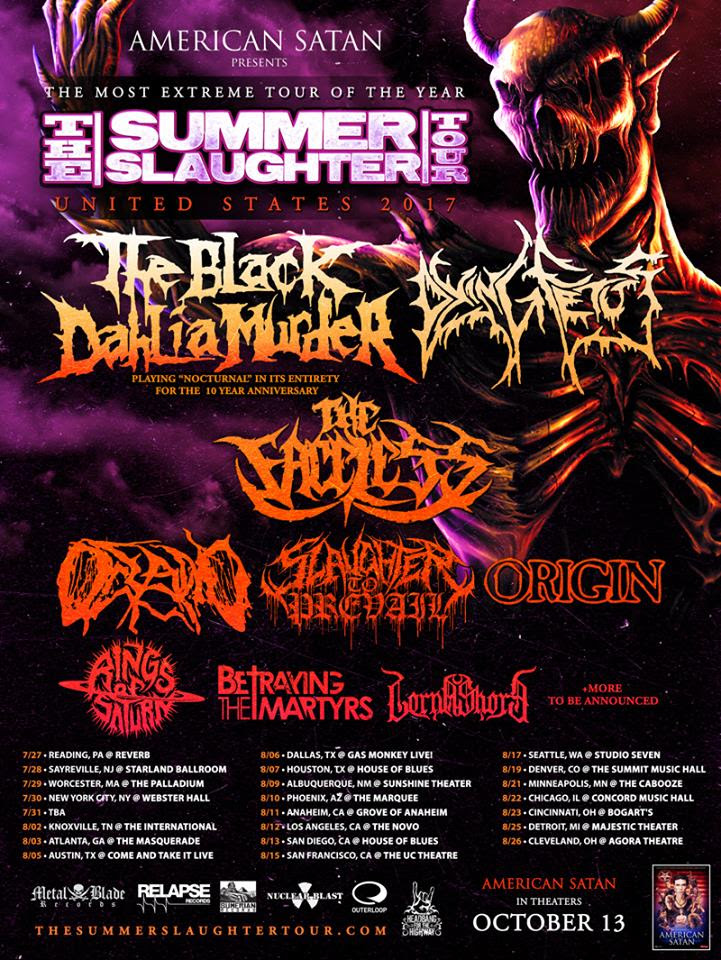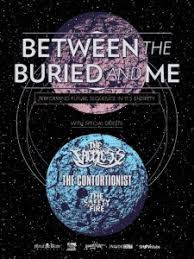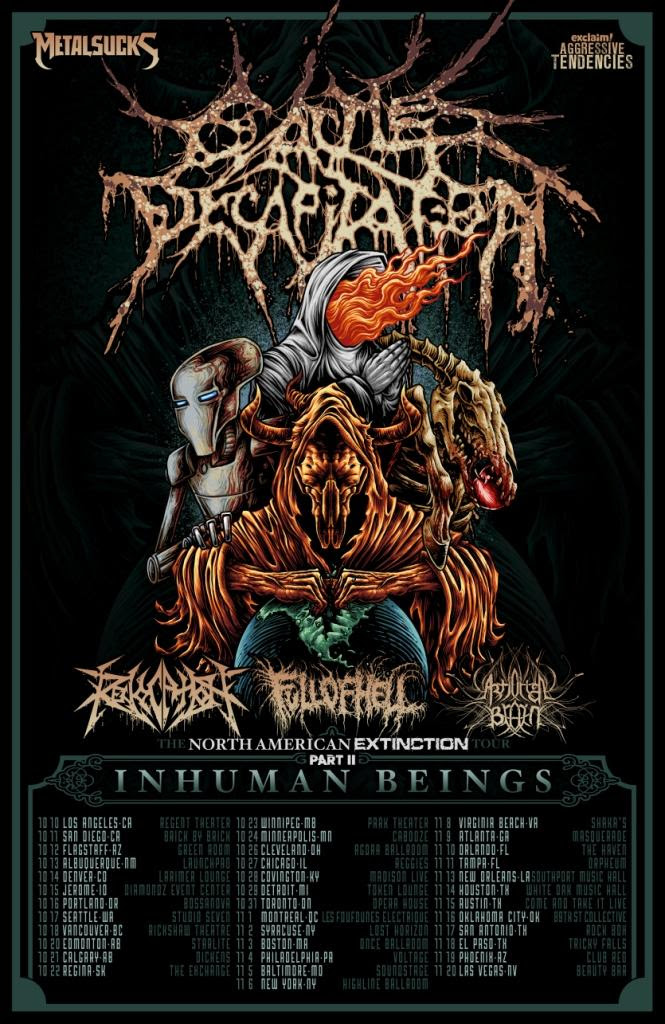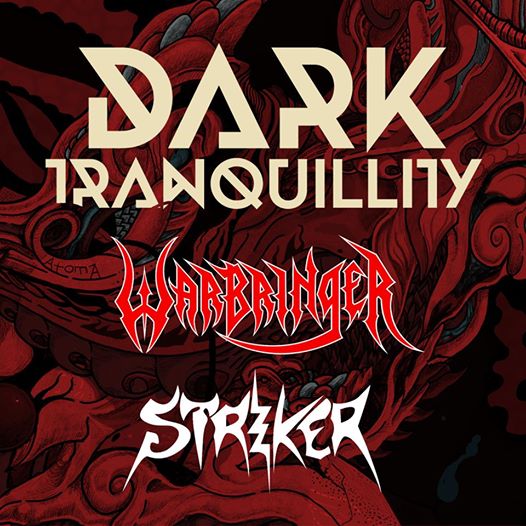Napalm Death Interview
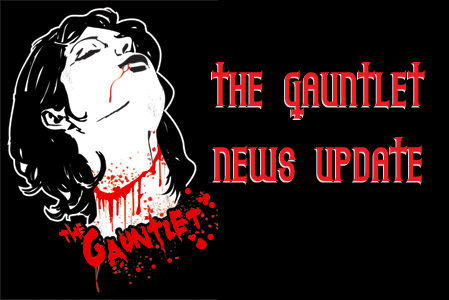 A band that no less than single-handedly created the genre of Grindcore, Napalm Death have issued more fantastic albums in their entire career than several bands can generally muster up. The group continues to slay audiences in concert and their latest Century Media Records release; "The Code Is Red-Long Live The Code" is their most brutalizing slab of grinding madness since the band's early output on Earache Records. Frontman Barney Greenway is without a doubt one of the most talkative personalities in all of heavy metal. Here, The Gauntlet's Senior Editor Erin Fox speaks with Greenway about the band's latest album before the pair lapse into a nice, healthy political discourse. In light of the recent terror attacks in the City of London, a portion of this conversation, which was conducted before the attack, takes on a whole new relevance. Read on, ye metalhead and discover the sheer sonic destruction that can only be described as Napalm Death.
A band that no less than single-handedly created the genre of Grindcore, Napalm Death have issued more fantastic albums in their entire career than several bands can generally muster up. The group continues to slay audiences in concert and their latest Century Media Records release; "The Code Is Red-Long Live The Code" is their most brutalizing slab of grinding madness since the band's early output on Earache Records. Frontman Barney Greenway is without a doubt one of the most talkative personalities in all of heavy metal. Here, The Gauntlet's Senior Editor Erin Fox speaks with Greenway about the band's latest album before the pair lapse into a nice, healthy political discourse. In light of the recent terror attacks in the City of London, a portion of this conversation, which was conducted before the attack, takes on a whole new relevance. Read on, ye metalhead and discover the sheer sonic destruction that can only be described as Napalm Death.The Gauntlet: Your latest album seems to be closer to the sonic destruction of the bands earlier days.
Barney Greenway: Possibly. I think "Order Of The Leech" and "Enemy Of The Music Business" before it were a good amalgamation of also, that classic style. To expand on that really, I think pretty much every Napalm album has embraced the core of the band's sound. It's just built around it to varying degrees. But for the point of the new album having a lot of thrust, it certainly has that. To be honest, after the album was recorded and I listened back to it, obviously with the benefit of studio production, it didn't surprise me. Here's things that jump out to me that I hadn't realized the impact of before. That was something that amazed even me, someone that had wrote a percentage of the album. I think we got an absolute fucking face melting sound on this one.
The Gauntlet: The production is very good and I think it represents you very well in terms of what Napalm Death sounds like as a live act.
Barney Greenway: I wouldn't disagree with that at all. And that's the way a Napalm album should be, you know? "Enemy Of The Music Business" and "Order Of The Leech" were that way as well, but there were a couple of things here and there that were very studio sounding, if you know what I mean. But with this album, the drums and the guitar, everything. It's just fucking really pretty brutal.
The Gauntlet: You actually have a lot of great guests on this record, among them Jello Biafra. How did it come about that you collaborated with these individuals on this effort?
Barney Greenway: If it had been left to our own devices, to be totally honest, the guests wouldn't have been on there. Not that we're not wanting them there, but in the past, obviously we've had several negative record label associations and we've never felt that we had the support needed when you're trying to concentrate on making an album that you would have the support structure that would arrange these things for you or at least help you in some degree. With Century Media, that was totally possible. They came to us and said "You know, you should have some guests on the album." We said "Well, we thought about it and there's the hassle of bringing people into the studio" and they said "No, seriously, we'll help you, we'll take care of it, we'll arrange the most part of it." And they did, to their credit. So we could arrange that and they took care of the whys and wherefores. So they enabled us to not worry about it and obviously, the guests came along and did a fantastic job in the context of the songs that they were given.
The Gauntlet: I thought that the Jello appearance was really cool. It's interesting to hear the combination of your distinct styles. He quite fits in with what you guys are doing.
Barney Greenway: That's one that's really, really cool. All three guys did a great job, but it's the Jello one that really hits you in the gut, you know? There's been that long association with Alternative Tentacles, the "Nazi Punks Fuck Off" thing, there's the ethical thing, the humanitarian thing. Equality, tolerance, things like women's rights, pro-choice, anti-war, anti-racist, anti-fascist, that sort of thing, it's all there. It's a nice contrast in the song, because Jello's voice is pretty far removed from mine, you know?
The Gauntlet: Since Napalm Death is the self-proclaimed "Enemy Of The Music Business", how is it for you to be currently dealing with a label such as Century Media?
Barney Greenway: Well, you know what, man? I'll say this, "Enemy Of The Music Business", when it came out was a strong shag tag like "Fuck this", obviously with what we had been involved in, where we have been ripped off, been deceived, exploited. Now, when you are in a band, you cannot deny that you are in a business, at work to some degree, whoever you are and whatever your ethics are, because you're selling albums at the end of the day. Whether you are on a small DIY label or whether you are on a big indie. The difference is how you conduct your business. You can be involved with a label that is a complete rip-off, or you can do something about it. You're right, Century Media is a big indie, but I'll tell you what, man. They look after their bands more than any other label that I've been in contact with or worked with. That to me speaks volumes. Whereas in the past, we've worried about the problem of trying to contact someone at a record label and you get a voicemail for like, six days. The band calls the label six days in a row, and its voicemail every time. It's like they know you are going to call so they look at the caller ID and they just ignore you. With Century Media, if you've ever got a problem, you can call them right up and there's someone there to talk to you about it. So that's a big difference for me. Also another factor is the promotion. One of the things that really clinched it for us with Century Media is that they really said that they were going to help us with promotions, and that's what they have done. The transformation in the number of interviews that are coming through is one thousand percent, in an increased amount. It's almost like a brand new situation, even though I have been in the band for sixteen years now. And to think in that amount of time that it's come to the point where we're getting a more than satisfactory level of support, it's fucking ridiculous. But that's the way it is. So, Century Media really does give a shit about the bands, and from that perspective, I don't really have a problem with them at all.
The Gauntlet: Is it easier for you to focus on the music knowing that there's an absence of tension with the label?
Barney Greenway: Exactly. Think about it. You go out on tour and you do your absolute best to spread the music, to spread the ethics, you look around and your label's there, completely apathetic in the background, sitting there, twiddling their thumbs. You turn up at venues and people are there saying "Shit, Napalm Death put out a new album, I thought you'd split up six years ago". I think that clearly has to do with no coverage, no interviews, apart one or two here and there. With Century Media, that hasn't been the case and that gives you even more impetus to go out there on the road and do your albums and really push the bar heavily in terms of performing the best that you can, playing the best that you can, et cetera.
The Gauntlet: What is on the slate for Napalm Death this summer in terms of live appearances and touring?
Barney Greenway: It's going to get tweaked a bit; it's not in its original format. But we have a European tour with Diecast, Most Precious Blood. Diecast, you may be familiar with, they're on Century Media. Most Precious Blood is a hardcore band, they're on Trustkill records. So that's the plan for Europe, for the States, September is when we're looking at coming. We've actually tried to arrange a couple of things before this, but for some reason it has fallen through. Ironically enough, although the vibe is quite different, something that it hasn't been in years, it has been actually quite difficult to arrange something at this point.
The Gauntlet: Will you be headlining the States this go around?
Barney Greenway: It will be a package bill, where we will fit on the bill, I don't know at this point, but it's not going to be loads and loads of cites, it will be eighteen gigs as far as I know. So it may well be mainly the big cities, I'm not entirely sure yet.
The Gauntlet: I had the pleasure of catching Napalm just a few months back, and it was a fantastic performance. It must be very difficult to follow a Napalm Death performance.
Barney Greenway: That's nice of you to say so; it was quite the interesting bill. Obviously we and Cannibal Corpse are quite different bands. Of course, we have some death metal influences from the old days, but mainly we have the sort of hardcore, punk rock thing going on and that makes for a lot more, sort of, controlled chaos, if you want to use that phrase. So yeah, Cannibal Corpse are going for the very sort of on the book delivery, but with Napalm, it's that sort of race to the finish line. It was good for us. I hope this doesn't sound cliche, but I play every gig like it's my last gig. I'm happy to have people in front of the stage interested in Napalm Death and I want to give them the absolute best that I can. I've seen some bands that go out on stage and fart about and that to me is cheating the audience and it's cheating themselves as well.
The Gauntlet: It's so important for fans to be able to get that one hundred percent out of a band and it's the only way that the band will get one hundred percent out of the crowd in return.
Barney Greenway: Of course, there's going to be times when someone's ill or a couple of people are ill and the band's performance can be a little under par. Performance can also be affected by technical problems on the stage; it can knock them out of their stride. It doesn't bother me particularly, because I make the most out of any situation. If a monitor were to blow up in my face, I'd just kind of laugh it off, you know what I mean? It doesn't work that way for some people. So I think you should go for it.
The Gauntlet: Obviously, Napalm Death has been so influential for so many other artists. Having been the band that started the whole grind phenomenon, how does it feel from your perspective to be a band that is considered to have been such an innovator with this extreme style of music?
Barney Greenway: Put it like this, one of the reasons that I'm still in Napalm Death, I didn't join Napalm Death to be a muser, I joined Napalm Death to be in Napalm Death. If Napalm Death finished tomorrow, I could not start another band, because, think about it, I've been in a band that takes its music to the nth degree and is considered pioneering. You couldn't get that adrenaline rush anywhere else. Once you've had that, how are you going to experience it again? Not to sound arrogant or anything, it's not meant to be, I'm just trying to put across the feeling of being in the band. By the same token, it's nice to be part of the band, but to continue to be a part of the band, you can't let it go to your head and go "Fuck, I could fart in a particular direction and people would love it." You can't think like that, because in order to continue to make an impact, you have to consistently come up with challenging music and past that point, with challenging ethics as well. So, yeah, that is what continues to push me along and we feel that we can still do that. It's great to be considered this very influential band, but to a point, you have to push that to the background and just get on with what we need to do.
The Gauntlet: Could you tell me about the politics behind the band's themes for those who are unfamiliar with the message that you strive to deliver?
Barney Greenway: Sure, what would you like to talk about?
The Gauntlet: Certainly, Napalm Death has always dealt with a lot of important political issues, this being a trait that has always distinguished your band from other extreme bands that sing about morbid topics and the like. It's very interesting that Napalm Death has continued to use these political themes; it certainly makes for a more intelligent listening experience.
Barney Greenway: I totally take your point. Napalm Death originally came from a movement called the Crass movement. If you know about that or aware of the Crass movement at all, it was a band from England called Crass who were an anarchist punk band. They weren't just your run-of-the-mill punk band; they were a band that were having questions asked about them in Parliament because they were considered to be highly subversive. They were doing things that were affecting the balance of certain things in the country, in terms of their influence on people. Napalm comes from that, Napalm Death are actually a part of the Crass movement. The name Napalm Death is actually an anti-war statement. Obviously Napalm was the defoliant that the US Army, and Air Force used in the Vietnam War to clear forests where they could unearth quote unquote "the enemy." Consequently, they ended up dropping it on people and it became an absolute heinous weapon of war. So that's what Napalm Death means. We carried that through the years because it is something that's a legacy, it's an embodiment of the band. Bringing that into this day and age, here or hereabout. From my personal perspective, beyond the context of politics, I am a humanitarian. I believe in tolerance, I believe in equality, I believe in peace. I also believe as a human being that walks upon this Earth, that I shouldn't be oppressed by government. I don't wish to be subjected to restrictive powers by the government. I don't want to be subjected to these things that are allegedly supposed to protect us, anti-terrorism laws, when I could be, for protesting for whatever, I could be put into prison with no legal recourse. I don't wish to be subjected to things like that; I refuse to be subjected to things like that. If you like, going back to the political, introducing the politics back into it, that's the whole crux of Napalm Death. To say that we're in an extreme music scene here, in order to appreciate to appreciate the extreme music scene, you have to be an extreme person, in terms of perhaps, being full of hate for other people or something like that and I am here to say that's not the case. You can be into this kind of music and still be a human being, a humanitarian. You can be in an extreme music band and say "Ok, my friend, he's gay. " Does that mean that I should have nothing to do with my friend anymore because he is gay? No, not at all, because you're a human being, first and foremost and it's his prerogative, it is his right to do as he wishes. He is still a human being that walks on this Earth. That is his perfect right to do so, you know? That is the general crux.
The Gauntlet: In English Parliament, are they passing laws in the name of anti-terrorism that restrict the liberties of the average English citizen?
Barney Greenway: They certainly are. They tried to do that about a month and a half ago, when the government tried to put a bill through Parliament that's very similar to that portion of the Patriot Act in America where if they have a suspicion that you possibly might somehow be capable of thinking of committing a terrorist act, they can imprison you indefinitely, without legal recourse. They did try to put that through Parliament. Parliament overturned that, for now, although I suspect that sooner or later, it will go through with some restrictions. So they also want to do that. For the Labour Party, a party that I used to be a member of, that was a left leaning party, so to say that they were representative of human rights, of equality and of protection of poor and the defenseless. For a party like that to come up with something like that it's pretty fucking shocking and it's pretty fucking disgusting. I know it's easy to bash Bush, it's the easiest thing in the world, but for a lot of Labour Party members and traditional Labour Party voters over here, the fact that Tony Blair so easily got into bed with George Bush is really, really, really disgusting to many Labour Party members. You're talking about someone that is supposedly a tolerant leftist; he jumps into bed with someone who is as about far right as you can go without bordering on fascism, that really leaves a really bad taste in people's mouths.
The Gauntlet: Do you find that the political parties in England are a mirror to those of the United States, whereas although they seem to stand for different issues, each party votes in concurrence of most of the same issues?
Barney Greenway: You totally hit the nail on the head there. Now in England, there is more definition, but in America, there is no difference. The Democrats, to me, are the party that surely, by definition, should be defensive of human rights and all the rest of it. Some of the things I heard on the debate platforms during the pre-election run in America, coming out of the mouths of supposed Democrats, really pissed me off. Even though I'm not an American voter, I was getting really fucking agitated. I'll come back to the British thing in a second, but for me, in my opinion, what America needs right now is radicalism. What you have now is this two-tier system in America, where the rich get richer and the poor get poorer and I have seen that with my own eyes. I think personally, I'll be quite specific, I think that a person like Ralph Nader would be ideal for America right now. I think he would kick America right in the ass. There are people on Welfare, in a supposed developed country, that are fucking dying out there. Well, I said that they're on Welfare, but they're not getting the Welfare because Bush is slowly grinding that away. With talk of privatizing the social welfare system in America, it's going to be an absolute fucking disaster. But going back to England, the definition between the parties is a lot greater. Having said that, the Labour Party has moved quite a lot to the right. I'd like to say I revoked my membership when they did that. So we have two major parties at the forefront and with Labour, you will be voting for a stronger national health service, whereas the Conservatives want to do away with free health. If we head toward the system that America has, correct me if I'm wrong, but that would be pretty fucking disastrous. Now, there are little parties in the background. The Liberal Democrats, who are actually, the way they are portraying themselves, is to be more left than Labour. But, I don't trust them. So it's a difficult choice. When we vote next week, will I go against the angry thoughts that I've had over the past few years and vote Labour, just to kick the Conservatives out? Because the Conservatives are actually doing a pretty good job of making themselves unelectable as it is. Do I vote Labour or do I vote Green, as I have, I think I am sort of torn over that and I will probably vote Green.
The Gauntlet: It does make it quite difficult, Barney, to be in such a situation as we have a similar dilemma in America, where if I wish to vote for, say a Libertarian candidate, it is guaranteed that regardless of which manner one would personally like to vote, the American voter is always faced with a "greater of two evils" choice because without popular and media support, a third party remains unelectable, regardless of whether or not they are the best choice to lead the Nation. It is impossible to vote your conscience.
Barney Greenway: No, no, no, it's certainly more tough for you guys. I would imagine that, speaking to you now, that you are certainly not sympathetic towards George Bush.
The Gauntlet: I am unsympathetic toward government. I believe in limited government and feel that a farmer is better suited to govern than an attorney.
Barney Greenway: You do sound like a libertarian, what you are saying. I think that there are things that we are going to agree on a lot, then we are going to disagree on other things. One thing that I do believe in, which is kind of shaky around the Libertarian movement, is the idea of social welfare. Because, I believe to move forward as a united body of people, where the poor are not allowed to slide into a sort of situation where you have pockets of mini-plague areas, so to speak, for lack of a better description, that you do need a government sort of, propping because I am totally for the Welfare State. I have to say that, I believe in being helped and aided by the government. That said, I don't think that it gives the Government license to restrict our freedoms. Some people say you cannot have one without the other, but I think you can, and you should. Especially when you contribute to the economy. We have something called National Insurance, which is supposed to help you when you have Social Welfare, when you retire and get a pension, when you go to the hospital and you get free health care. I believe in those things. I believe one hundred percent in the National Health System. I do not believe one iota in private health care, I am against it, I am totally against it. I think maybe that's where we could have a debate on the matter. Am I right, or am I wrong?
The Gauntlet: My position on Social Welfare is that if a country has a public economic system, as opposed to privatized currency lending, you greatly reduce the need for Social Welfare because the productivity of a Nation tends to create vast amounts of personal wealth for the many as opposed to the few. At least in America, if you look back at the time when this country was founded, there was a condition of sound money. During this period, most citizens enjoyed ample wealth to support them throughout their lifetimes and the unfortunate were aided by charity, because the citizenry generally had sufficient wealth to do so. I believe that in a system where the government does its job and pays an amount of money into circulation that is congruent to productivity, the tendency lends toward great wealth for a citizenry and this solves ninety-nine percent of the cases in which aid is required. I think that the problem in Social Welfare when dealing with a system that involves privatized lending of currency to Governments, the government and subsequently, the bank, is given an enormous power of taxation which is detrimental to the state of a country's economy and eventually saps the productivity of the people by means of interest. This power to tax tends to lead to restrictions upon civil liberties because as the nation is no longer dependant upon its own productivity, it becomes dependant on the government to redistribute wealth in order to provide benefits.
Barney Greenway: I take your point on that. The problem with that is that if you think about it very close, if you take the concept of anarchy, which is an ungoverned-well, you couldn't say society, because that's not really the word for it. But, the problem with anarchy, to dissect what you are saying, the problem with anarchy is that human nature always lends itself toward a lust for power and the problem that you have is that, even in a strong economy is that no matter how much money is accrued, most of the money sits in the upper echelons, the upper wealth of the country. Because, there are always going to be people at the top who, by their very nature, have the motivation to channel that wealth into very limited areas. That to me would apply no matter how much wealth is in the country. In certain countries like Monaco, which is such a small state that only millionaires moved there anyway, so it didn't really matter. But, in a society where you have very clear dividing lines in terms of wealth, and I'm talking about an equality perspective, because I actually believe in a sort of true equality. Some might say that's naive, but there you go. I think the way you have this clear divisions, I think however the economy expands, you are always going to have this situation where money is channeled into the upper echelons and the people at the bottom are just going to suffer more and more, which is why I think you have to set some kind of guidelines where a great percentage of wealth is channeled into the poor. And you know what, man? I will say this, and you may hugely disagree with me on this, but I think that certainly in this country, with taxes and value-added taxes, which you don't get in America, the rich and the corporations get away with absolute fucking murder when it comes to paying taxes because they exploit every loophole and they use every sort of type of corporate lawyer who will, sort of, nudge-nudge, wink-wink to the government departments and they will escape. Yet, someone like me, who is working class. I have to say that I am working class, because, that's where I come from, my family. I have to pay taxes, and that's fine. They will hassle me, absolutely badger me to no end for a few pounds of tax, but some fucking corporate company, down the road, won't get half the aggravation that I get and there is the inequality.
The Gauntlet: I actually completely agree, Barney, with that statement. Although I tend to be an objective thinker, as far as political parties go, I don't necessarily agree with every plank of the Libertarian, or for that matter, any other political platform.
Barney Greenway: No, and the thing about Libertarians as well, one thing that I actually find quite positive, even though, okay, you can say that it's a singular movement. But there are people from the natural left and there's people from the natural right, both in the Libertarian party, as far as people that I've spoken to. There are both sides of the natural divide, if you like, which I find quite interesting, actually.
The Gauntlet: I think that part of the appeal is that libertarians tend to be both economically conservative and socially liberal.
Barney Greenway: Which is an interesting mix, if you think about it.
The Gauntlet: Yes, it surely is. But, unfortunately, the whole center of that line of thinking revolves around a high degree of personal responsibility. That's the type of value that you can only bring into a society when you have the parents of families teaching their children responsible values.
Barney Greenway: Yeah, and what you have to figure is that some of us who walk this Earth need more help than others, and that's just the natural way of having developed and we have people of varying degrees of disability as well, and they need help along the way.
The Gauntlet: Absolutely.
Barney Greenway: There are many people who suffer from; just for example, there are people who suffer from mental illnesses that might not necessarily be apparent on the surface. But their life suffers eternally because of that and I think that people like that should be helped along the way, in many different ways. We've seen, in America, one thing that makes me sick to the pit of my stomach, is that Mr. Execution, Bush, will sign death warrants for clearly mentally ill people, and that to me is completely unjustifiable.
The Gauntlet: Certainly. But Barney, I think that in America, we're in a situation where there is no choice. Whomever we vote for, we're going to see the same types of exercises carried out. And I don't believe that putting Hillary Clinton in office in 2008 would change the direction we're headed.
Barney Greenway: No, I agree with you on that one. Of course, there are some things that I naturally agree with Hillary Clinton on, but throughout the general Democratic Party, it becomes less and less each year.
The Gauntlet: What would you think if her husband emerges as the next Secretary-General of the United Nations?
Barney Greenway: That's a tough one Erin, because, Clinton sent the bombs into Kosovo. Now, it's debatable whether that really sort of appeases the situation, of if it was done to appease N.A.T.O., there's been a question mark over that all these years. Obviously, there were some pretty terrible acts going on over there, but as Bush's heavy-handed doing with Iraq, you know, was it really, really necessary? Was it solving anything to throw thousands and thousands of bombs on a capital city? I don't really think that it achieved anything, it basically just knocked down a few buildings, killed a lot of people and still, the conflict was there, so what was the point, really? I don't know, it's a weird one. I really couldn't say on that one, to be honest. Do I think that we can trust Clinton that much, as some people embrace him and trust him? No, I don't. He has some very sort of liberal sympathies that I hold as well, but I am sure that there are many things that he and I would disagree on. Here's another thing. Is it really right for a former U.S. President to head an organization like that? Is there some kind of conflict of interest, when the U.S. is obviously the biggest in the world, the biggest superpower? Should there really be anyone that has been connected with the Presidency at the head a huge organization like that?
The Gauntlet: So, what is your position on globalism? Because this is an agenda that the superpowers are obviously pursuing.
Barney Greenway: Yeah, globalism, it's something that's spreading. The thing is that there are countries that are exploited in countries where the workforces are being utilized and they are used because the companies know that they can pay people absolutely nothing. They can build more sweatshops; they can build more really sort of dubious factories and things like that. It's something that concerns me greatly and of course with globalism comes the whole thing, there's a stigma about conspiracy theories, but there's a point when conspiracy theories tend to become sort of reality. There's quite a major foothold. Again, it becomes really easy to Bush-bash, but because he's the main sort of figure, he becomes the obvious target. He's getting his claws into a lot of places at the moment. To be fair, it doesn't even come down to him eventually. You've got companies like Halliburton, who are spreading their wings quite far and wide. You've got McDonalds as an example of something that is spreading its tentacles and has choked, in terms of restaurants, has actually choked many of the restaurants.
The Gauntlet: What is terrible about that situation is that when one of those types of companies comes in and takes the business away from independent operators, who tend to go out of business, it really does take a part of the culture of the community along with the exiting business.
Barney Greenway: I couldn't agree more with you.
The Gauntlet: Barney, it has been a fascinating discussion. I think that we have talked about politics a bit more than music, but it is really nice to have this type of discussion with an artist.
Barney Greenway: You know what, man? I'm easy to talk about whatever and I get off on that. I am an absolute staunch advocate of certain things and I'm always willing to talk about those things. To be fair and no disrespect to yourself as an American, if the greater percentage of the American population would just open up its fucking eyes, you know? Maybe something would start to change.
Read More News
Tags: Napalm Death , Barney Greenway, interviews
EF August 01, 2005

